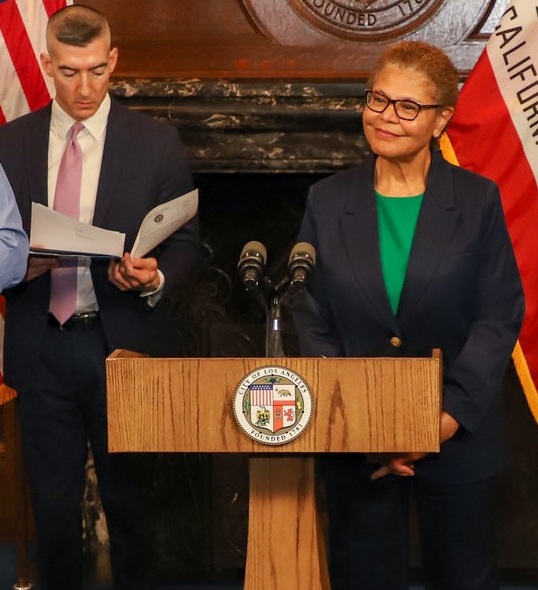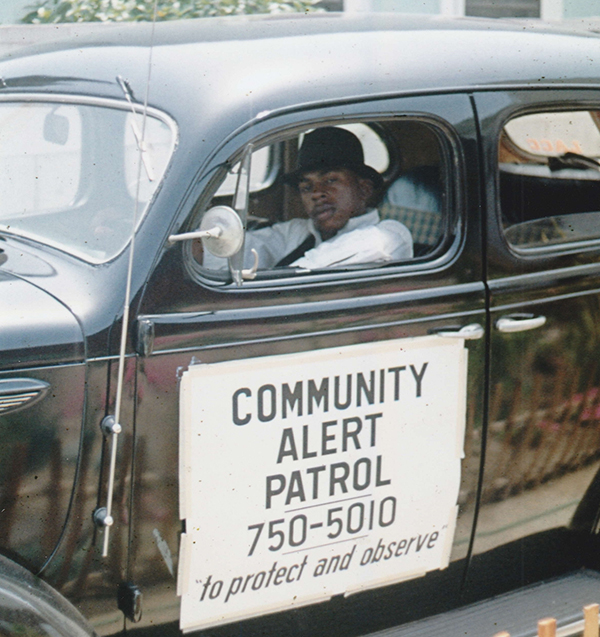By Janice Hayes Kyser
Contributing Writer
LOS ANGELES — Millions of letters and packages stacked up to the ceiling sat idle in rat-infested warehouses in England and France during World War II. While the undelivered mail continued to pile up the morale of the troops plummeted. Army brass knew they had to take drastic action so they called in the all-Black female battalion known as the 6888. The rest, as they say, is history.
Faced with a herculean task, the 855 women of the 6888th Central Postal Directory Battalion got the mail moving and uplifted the spirits of the soldiers fighting on the front lines and their families back home.
“My mother and her incredible comrades did something no one else could,” said Alva Stevenson, daughter of deceased 6888 member Lydia Thornton. “They worked around the clock, solved the problem, created their own self-sustaining city on foreign soil and confronted racism and sexism with grace and grit.”
Stevenson, now 66, was in junior high when she first learned her mother was a member of the 6888.
Today, the retired UCLA librarian and Inglewood resident is fighting for her mother and the 854 other African-American women who served in the battalion nicknamed the Six Triple Eight to receive a Congressional Gold Medal of Honor for their meritorious service.
On Oct. 21, the Los Angeles Branch of the NAACP’s Armed Services & Veterans Committee is screening the film “Six Triple Eight,” a documentary by filmmaker Jim Theres on the heroic efforts of the 6888 Battalion. The NAACP, other organizations and the families of the 6888 are lobbying Congress to obtain the more than 50 signatures that are currently needed for the 6888 to receive the Gold Medal of Honor, the nation’s highest expression of national appreciation.
Felicia Banks-Ali, chair of the Los Angeles NAACP Armed Forces and Veteran’s Committee, and an Army veteran, says ensuring the women of the 6888, many who hail from California, are honored at the highest level, has become a passion project. Ali is an integral part of a recent screening of the 6888 documentary at the Barbara Morrison Performing Art Center.
“It’s time for a nationwide clarion call to finally put the stamp of history on these amazing women,” Ali said. “If a group of us have to stand on the Capitol steps holding up signs and banner, we need this to happen. There are only seven living members of the 6888.
“It’s a tragedy that so many of them died without seeing this come to pass. I do not want to see another one die without this honor being bestowed.”
Retired Army Col. Edna Cummings, one of the producers of the documentary, agrees.
“These women changed the course of history,” said Cummings, a 26-year Army veteran. “The troops were losing their will to fight and carry on. Army brass knew this was a huge problem because the troops had nothing to give them hope.
“They hadn’t heard from their loved ones and their loved ones hadn’t heard from them. These letters and their contents were their lifeline. Communication is vital to morale, especially in war time.”
Ironically, Cummings said, Jim Crow laws and racism that plagued members of the 6888th at home, prepared them for this difficult assignment abroad.
“These women knew hardship and hard work,” said Cummings, who resides in the Washington, D.C. metropolitan area. “They had to be resourceful to survive.”
In 1945, under the command of 26-year-old Maj. Charity Adams, the first Black woman commissioned officer in the Women’s Army Corps (WAC), the 6888 sailed to Birmingham, England and later transferred to Rouen and Paris, France to tackle rat-infested warehouses filled with millions of pieces of undelivered mail and packages, many with incomplete names and addresses.
Cummings said the women knew they were set up for failure, but failure was not an option. The women devised a methodical system to identify, sort and connect the mail with its intended recipients processing 65,000 pieces of mail per shift.
“Working 24 hours a day, seven days a week, they displayed incredible discipline, dedication and detective work to help ensure the mail got to where it needed to go,” Cummings said. “Our country can never repay these women for what they did by linking our soldiers to their loved ones.
As a Black woman officer in the military, there is absolutely no doubt that they blazed a trail for me and other Black women and men to serve. “
Yet, after accomplishing this herculean task, the women, many of whom were in their 20s, did not receive praise, accommodations or parades. Instead, they came home to Jim Crow laws that rendered them second-class citizens and started families and pursued careers.
In 2018, a memorial recognizing the contributions of the 6888 was erected at the Buffalo Soldier Military Park in Fort Leavenworth, Kansas. Stevenson and her younger sister Rosenda were there to see the monument to their late mother, who went on to become a teacher and continued to serve others in her Culver City community as what her daughter calls “an informal social worker.” In 2019, the U.S. Army recognized the battalion with Meritorious Unit Commendation for their exceptional performance during World War II.
Stevenson said her mother, who grew up in Nogales, Arizona and was Afro-Latina, was given an option of enlisting with either a white women’s battalion and a Black women’s battalion because of her light complexion, but opted for the latter to learn more about her African American heritage. At the time, given the racial climate in the country, it was a brave and bold decision.
“My mother and the women of the 6888 enlisted to serve a country that didn’t serve them fairness and equality,” said Stevenson. “They took what looked to be an impossible task and accomplished it in a manner that had an enduring impact on history.”
Both Ali and Cummings say that recognizing the 6888 with a Congressional Gold Medal of Honor would be a significant milestone in the country’s racial reckoning and the first-time women of any color have received the nation’s highest honor.
“Our country needs to acknowledge that Black women are and have always been a major force in this country, just ask Stacey Abrams,” said Ali, who served as a noncommissioned officer in the Army for 23 years. “Sadly, we as Black women, especially Black women in the military, are still fighting to be acknowledged for our gifts, skills and talents.”
For Stevenson, it will be a recognition that her mother’s service to her country is not another parcel of hidden history.
“It is about righting a past wrong,” said Stevenson, who says her mother enlisted to honor her uncle who was serving in World War II. “My mother and the women of the 6888 embody what it means to be an American.
“The lesson we can all learn from the 6888 is that you can take on what looks to be an insurmountable problem and determine its solution. It takes teamwork and ingenuity. Their service, their sacrifice, their purpose and their mission deserve to be remembered and recognized.”
The Oct. 21 screening will take place at 4 p.m. at the Barbara Morrison Performing Arts Center, 4305 Degnan Blvd., in Leimert Park. For information, call (213) 446-2053.











